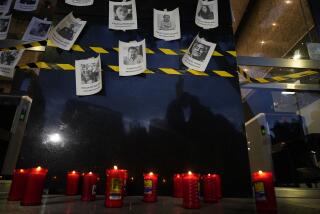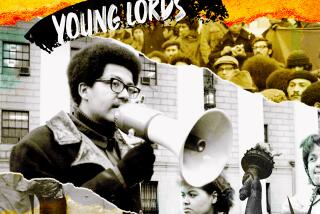Q&A: After 20 years covering West Coast, Bill Whitaker goes to ’60 Minutes’
After more than 20 years and 2,000 stories out of the West for CBS News, veteran broadcaster Bill Whitaker has been lured back East by “60 Minutes.” The Emmy-winning journalist, who has covered Mitt Romney’s 2008 presidential campaign, the Fukushima nuclear disaster and the war in Afghanistan, was named a correspondent in March and will make his debut on the news magazine show this Sunday with a report on the arrest of Joaquín “El Chapo” Guzmán, the former head of the Sinoloa cartel and one of the most powerful drug traffickers in the world.
You covered the West Coast for CBS News for 20 years. That’s a pretty large territory. What made that beat unique?
The Los Angeles bureau was responsible for everything from the Rockies to Hawaii and Alaska to Chile. The variety of stories, that’s what keeps you going. You can be hiking through the woods in Yosemite one week and down at the border doing drug cartels the next. It’s a very wide variety of stories there.
How does it work when you get the call to go to “60 Minutes”?
They asked if I would contribute to “60 Minutes Sports” last year. We did a couple of stories for “60 Minutes Sports,” so that was the smoke signal. That went fairly well. Then I got the call, come to New York to talk to [CBS News chairman and “60 Minutes” executive producer] Jeff Fager. I was telling my wife, ‘You don’t get called to NYC to talk to the big boss unless it’s something really good or something really bad.’” I came and got the good news.
Was that always an aspiration for you?
I bet you any broadcast journalist would tell you if they’re honest, that at any network they would like to end up at “60 Minutes.” It’s the dream job for broadcast journalism.
What kind of stories are you going to bring to “60 Minutes”? Anything the show is lacking that you can add?
When I was in Los Angeles, my beat if there was one, was the border. I would like to be able to keep up with that. The border issues, they’re just never going to go away. They’re current and important, I know a little bit about that so I think I’d like to keep my finger in that pot. We did go down to Mexico to do a piece about the arrest of the drug lord, El Chapo. I’ve got another piece in the works on Stradivarius violins. So from drug gangs to violins.
Do you enjoy being a generalist?
I do, I think that’s one of the things that makes this job most interesting to me, not necessarily “60 Minutes,” but broadcast journalism, that I get to go to so many places and see so many people.
You really get to immerse yourself in a subject.
With “60 Minutes,” it’s kind of a luxury. You do have the time to develop the story and get into the meat of the story and do it right. You have the time and the resources. With the “Evening News,” you know that ticking clock they’ve got on “60 Minutes”? Well, you’ve got that daily. You have a deadline every single day, the struggle there is more for hitting that deadline. ... [At “60 Minutes”] you get all the resources, all the time and you just better get the best damn story possible. That’s all that’s required.
“60 Minutes” is known for having a competitive work atmosphere. Do you feel that?
Everybody’s been very, very welcoming and kind, but everybody wants to get that best damn story on the air. I had a welcome to New York party a few weeks back. It’s like you are competing with all of the best people at CBS News trying to get the best stories on the best broadcast. So, yes, it’s competitive.
The show has obviously taken a beating in the past year. Is there any sense of that in the air behind the scenes -- of the need to uphold the “60 Minutes” reputation?
I came here after that, so I can’t give you a before-and-after description of the atmosphere. What I do know is everybody here is dedicated to doing the best job possible and respecting the institution that has been developed here over the past 47 years. People are not walking around with their shoulders hunched over. I see lots of energy and determination to do the best job, to do the sort of job that “60 Minutes” is known for.
You’ve reported all over the place and covered all kinds of stories. Was there a story that was the hardest, either logistically or emotionally?
I went down to the Mexico-Guatemala border about 10 or 12 years ago to do a story about the train young people would try to hop to go up the length of Mexico to the U.S. border. Talk about logistically difficult. I was down with a producer and she was very familiar with Latin America. I was like, “OK, when does the train leave?” She said, “There is no real schedule. When they load the train up, it’ll leave. We just have to wait.” We waited for several days. And then somehow word starts to spread that the train’s about to take off. And then the kids come running out of the bushes and climb all over the train and it heads north. In the very beginning it’s almost festive. All the kids are headed to America.
But then it very quickly becomes grim at every stop you have to jump off the train because the federales are there to get people who are in the country illegally, they run off into the bushes where the bandits are hiding. They get assaulted or raped or robbed or whatever. Then the train starts moving again and they all come running back out of the bushes. We were there when a kid slipped and fell under the wheels of the train and got cut in half by the train. It’s a harrowing, harrowing ride and the chance that you’re going to make it to the U.S. border safely is almost nil. ... The draw of the U.S. is so strong and the push of whatever it is they’re trying to get away from is so strong, they’d rather take the ride on this train of death. I just can’t see something like that and walk away and say, “Have a nice day.”
You spent four years in Japan as CBS’ Tokyo correspondent. How was that?
I came to like Japan quite a bit, to respect the people and its traditions. There are lots of things about Japan when I first got there, if CBS had said at the end of the first year, “You can come back,” my wife and I would have said “OK!” Everything is upside down, and I don’t mean that in a critical way. Little things. We walk on the right, they walk on the left. In the U.S. men will stand back to let the women get on the elevator first, there the women stand back to let men get on the elevator first. Everything is like that, everything you think you know you have to relearn. After the second year we liked it a little more. By the fourth year we had signed up for another contract, but CBS had different ideas and reassigned me to Los Angeles.
You were there at end of the Japanese boom.
I got there at the end of the bubble. ... People were eating gold, literally they would sprinkle gold into soup or wrap sushi with a thin layer of gold leaf. It was “Let the good times roll.” And then the bubble burst. So it was a very, very interesting time to be there. As the Tokyo correspondent, you were sort of covering all of Asia at the time, so I was in China for Tiananmen Square, the Philippines for Corazon Aquino taking over, the U.S. bases closing, the opening of Burma, Aung San Suu Kyi, quite a bit going on in Asia. It was a fascinating time to be there.
Twitter: @MeredithBlake
More to Read
The complete guide to home viewing
Get Screen Gab for everything about the TV shows and streaming movies everyone’s talking about.
You may occasionally receive promotional content from the Los Angeles Times.






